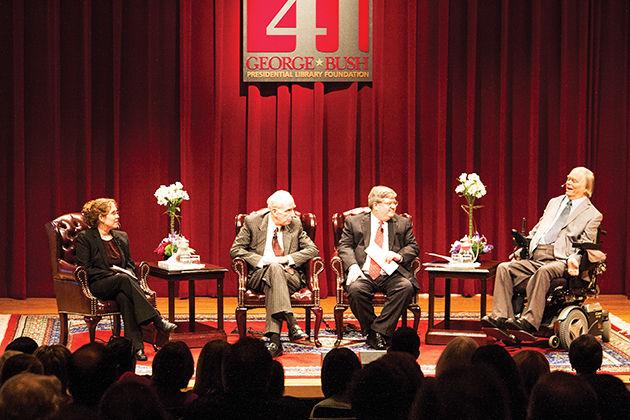When Lex Frieden found himself denied admittance to Oral Roberts University outside of Tulsa in 1968 due to his physical disabilities, he made it his goal to help others with disabilities.
Frieden, professor of health informatics and physical medicine and rehabilitation at the University of Texas Health Science Center at Houston, went on to be a large part of the effort to write and pass the Americans with Disabilities Act. Frieden shared his story among other panelists at “25 Years of Accessibility,” an event put on by the Bush School Thursday to commemorate the 25th anniversary of the ADA.
“My application was turned down, and I thought there was a mistake … And [the dean of admissions] said, ‘You’ve indicated on your application that you use a wheelchair for mobility, and our policy is not to admit students with disabilities on the campus,’” Frieden said. “I felt embarrassed. I felt guilty.”
Another panelist at the event was Larisa DeSantis, former poster child for the Epilepsy Foundation of America who served as the spokesperson while President George H. W. Bush was in office. DeSantis said her experience as spokesperson offered a silver lining for her childhood.
“I got to meet people like Tony Coelho, which was very cool because he had epilepsy too. And he was not allowed to go into the Seminary and seeing pictures of him riding — I can’t remember if it was a horse or a bull — but he was doing some kind of rodeo riding and seeing that that was possible was really important,” DeSantis said. “Folks with disabilities have different abilities and we can do many things.”
Clayland Boyden Gray, founding partner of the D.C.-based law firm Boyden Gray & Associates LLP., shared a story about Evan Kamp, who graduated third in his class from Virginia Law School, and was unable to get a job in the early 1960’s because he was disabled.
“This of course would never happen today, but that’s a measure of how far we’ve come,” Boyden said. “To think that someone in the early 60’s could not get a job because they were in a wheelchair.”
In addition to the ADA’s success in terms of public acceptance for those with disabilities, Boyden said the act has also had an international impact.
“Nearly 200 countries have copied the ADA and I don’t know of any other statute that comes anywhere close to that kind of international recognition and imitation,” Boyden said.
Although the ADA has been around for 25 years, Frieden said people with disabilities still have trouble finding jobs.
“In the year 2020 there will be more people with disabilities in this country that need help in the home than we do today,” Frieden said. “Those are challenges that we have to look at ahead now.”
Desantis said despite the success of the ADA, there are always problems of discrimination.
“It’s important to recognize the abilities that folks with disabilities bring to their jobs,” Desantis said. “I’m hopeful that eventually we’ll continue to plod down this path where there’s less and less discrimination, especially by employers.”
Marian Cothran, program coordinator of the biotechnology program at A&M, attended the event, and said some of the information presented in the panel surprised her.
“I thought it was very moving, and I especially liked seeing the young girl fulfill her writing to President Bush,” Cothran said. “I had no idea about the backgrounds, and how the American Congress worked together to pass the ADA.”
Warren L. Finch, Jr., director of the event, said a big takeaway from the panel is that while the ADA isn’t perfect, it is instrumental in breaking down barriers.
“There’s still a lot more that we need to do,” Finch said. “And the Bush Library has hired many people with disabilities, and they all contribute and are loyal and hardworking, just like anyone else.”









